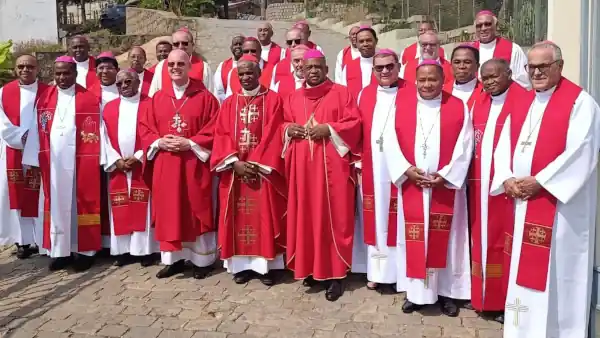22 June - Born as Pontius Meropius Anicius, he was part of one of the wealthiest families in Bordeaux. His tutor was the poet Ausone. He was consul suffect in 379. Like St. Ambrose of Milan, he passed from a political career to an ecclesiastical vocation.
Under the influence of the latter, Saint Martin of Tours and others such as Saint Amand of Bordeaux, successor of Saint Delphin - who had ordained him a priest - at the episcopal see of Bordeaux in 403, he devoted himself to evangelizing his diocese, converting and baptizing it. Saint Paulin left the "world" and went towards monasticism. In agreement with his wife and despite the opposition of the entire Bordeaux aristocracy, especially his master Ausone, he separated from his possessions and retired to the tomb of Saint Felix in Nole, Campania, in 394. He had already founded a hospital there when he was governor of that province. He now had a religious complex built there, dedicated to the worship of the local saint. Around 409, he became bishop of Nole. According to a writing of the priest Uranius, the day before his death he received the vision of Saint January, bishop of Benevento (Campania) from 302 to 305, and of Saint Martin of Tours, bishop of Tours, who came to lead him to heaven.
Paulin knew how to adapt the pagan poetic tradition received from his master Ausone to Christian horizons. In this adaptation process, he was inspired by his contemporary, the poet Prudence, whom he probably met.
Along with Prudence, Saint Paulin de Nole is one of the greatest Latin Christian poets. We have preserved 35 poems from him, very elegant, most of them in dactyl hexameters. These include annual "Lauds" in honour of Nole's patron saint, Felix, three paraphrases of Psalms (a literary genre that will have great posterity) and two propemptica (poems wishing a good journey). De Paulin's collection of 49 ornate letters is also preserved, testifying to his piety and personal sensitivity, as well as to the literary taste of the period.
Devotion to Saint Paulin is very widespread in the France of the Great Century. Numerous brotherhoods are created around the years 1665-1670; in order to speed up recruitment, the faithful are made to see the possibility of obtaining relics of the saint. They were long awaited and arrived in France in 1685. The arrival in France of the relics of the Saint of Colic and of fruit and vegetables aroused a certain echo in the milieu of devout humanism and in that of garden lovers (...) From the town of Nole in Campania, of which he was bishop, he keeps as an attribute the bell: the region was famous since Antiquity for the quality of the bronze of its bells. Popular legend then made him the founder of modern western church bells.








